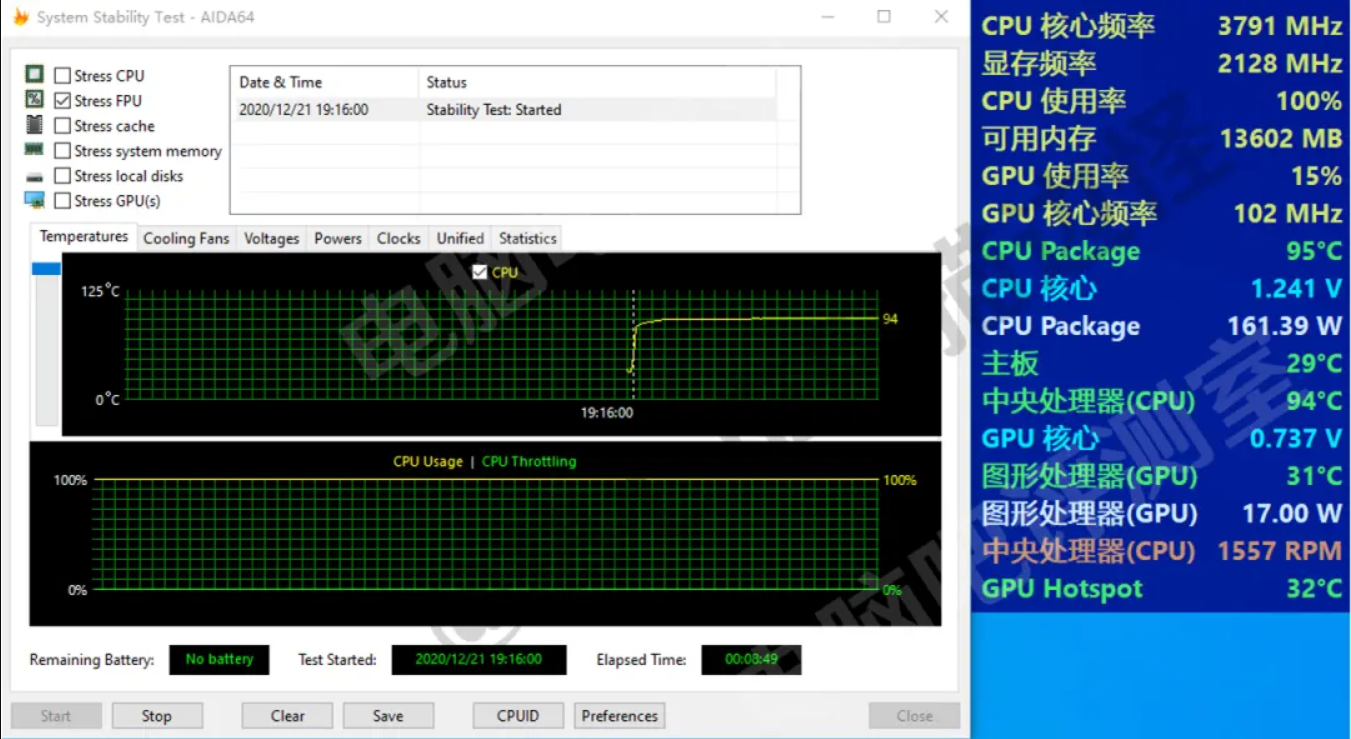Core i9-11900 Tested on B560 Motherboard
The chip can draw a lot of power under AVX-512 workloads.
Chinese news outlet Bilibili was able to get access to an unknown B560 chipset motherboard, along with an engineering sample Core i9-11900 (QV1J) processor to pair with it. The news outlet then ran a series of benchmarks to see how the new Rocket Lake part performs under a bevy of benchmarks.
We have additional details on the Core i9-11900 engineering sample that's floating. Simply put, it's a development version of the upcoming Core i9-11900 8-core/16-thread CPU, but with lower core frequencies than we'll see in the final release parts.
Bilibili believes the B560 board they have may not be the full version we'll see next year, as it seems to be a modified version of a B460 or simiilar model, as the board has no USB 3.2 Gen 2 ports whatsoever. The board does support PCIe Gen4, but only with an x4 link width. The board is powered by a 6+2 phase system and a 3-phase controller, but we have no screenshots of the board so we don't know what sort of cooling or what type of power delivery components the board is using.
Bilibili verified the chip uses Intel's new integrated Xe Graphics, Intel's replacement for the previous UHD Graphics found in older desktop parts. Bilibili tried to install a notebook Xe Graphics driver to get more functionality out of the chip, but the driver would not install properly due to it being designed for notebook SKUs. At least we have confirmation Rocket Lake will be coming with Xe Graphics, though that's not going to be particularly critical for desktop parts that usually end up paired with a dedicated GPU.
The 11900 engineering sample was run under several benchmarks including Cinebench R15, R20, and power consumption tests with AIDA64 with the AVX2 and AVX-512 (AVX3) instruction sets.
For Cinebench R15, the Core i9-11900 (ES) scored 217 in the single-threaded test and 1929 in the multi-threaded test. That's a similar result to a Core i9 9900K from a few years ago. In Cinebench R20 the 11900 scored 529 points for the single-threaded benchmark and 4683 in the multi-threaded test.

For power consumption tests under AIDA64, the core i9-11900 averaged around 120W of power usage with the AVX2 instruction set, which is pretty typical and shouldn't be a problem for most coolers. However, that changes with the AVX-512 instruction set, which allows the CPU to hit 160W of power draw.
Get Tom's Hardware's best news and in-depth reviews, straight to your inbox.
Bilibili also makes the point that this was all under the standard PL1 and PL2 ratings in the motherboard BIOS. PL1 is set to 65W and PL2 to 224W at default. If you fully unlock the PL2 limit (to 4096W) Bilibili says the 11900 will easily shoot beyond the default PL2 wattage which is 224W under AVX-512 workloads. Hopefully, Intel can further optimize AVX-512 workloads to not be as power-hungry as they are now with this Core i9 engineering sample.
Will AVX-512 be useful on Rocket Lake, or will it end up behaving more like a power virus? We'll have to wait for retail hardware, as early firmware and silicon could account for the current behavior. New for Rocket Lake, the activation of AVX-512 workloads shouldn't forcibly downclock all cores to the AVX turbo frequency. This can help a lot in AVX-512 scenarios that only require a couple of cores.
Again, this is an engineering sample, so performance is quite low right now. We expect performance to be much greater on the official SKUs coming next year.

Aaron Klotz is a contributing writer for Tom’s Hardware, covering news related to computer hardware such as CPUs, and graphics cards.
-
GoatGuy Power demand is no big deal so long as it engineered to be competent over the long haul. For ANY "real application" that demands the last iota of performance, the saying "until the rack catches fire, there is no such thing as too much power".Reply
However, for most of us, this'll either be, or sounds to be overkill. I am beginning to prefer the more stable-and-unstretched performance-vs-power ratings of the EPYC and THREADRIPPER beasts. Intel might technically 'beat them' with this, or with the 'real copy' instead of the engineering bauble, but I think most anyone would welcome 90% the performance for a 75% or better power saving, overall.
Just Saying...